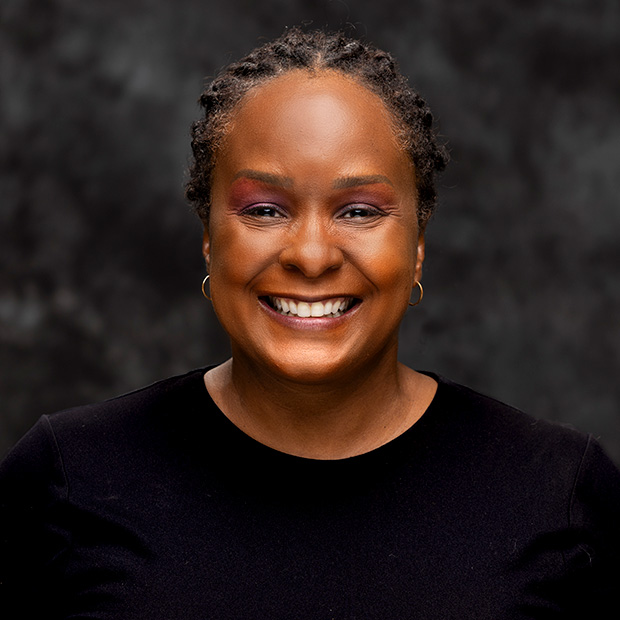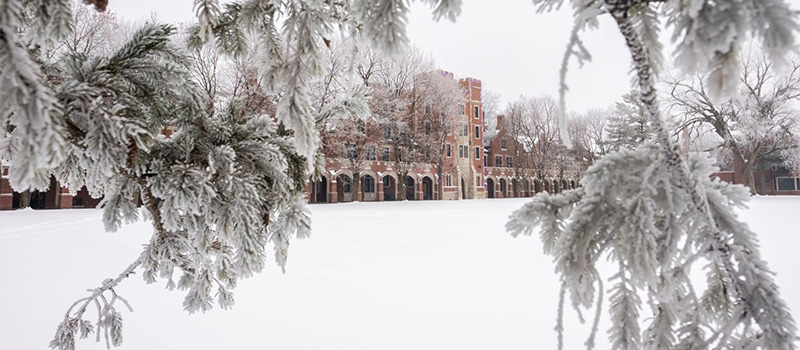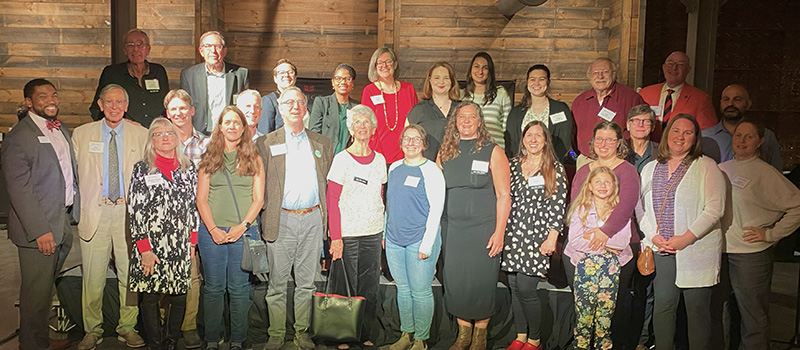Get to know Bernadine Douglas
November 16, 2023 — Bernadine Douglas began her role as Grinnell College vice president for development and alumni relations on Aug. 7.
 Bernadine Douglas
Bernadine Douglas
As a first-generation college graduate, Douglas embraces the philosophy that colleges should be strongly committed to increasing access and affordability for every student. She came to Grinnell with a wealth of experience and expertise in all areas of leadership, with a particular focus on fundraising and operational objectives within higher education.
Her career has included serving as director of major gifts at the University of Central Florida (UCF) and vice president of external relations at Embry-Riddle Aeronautical University. Her leadership continued at Berea College in Kentucky where she served as vice president for alumni and college relations. In 2019, Douglas took over as vice president for institutional advancement at Barry University in Miami.
As part of ongoing effort to introduce Bernadine to the alumni community and vice versa, she recently participated in a Q&A session with writer Jeremy Shapiro.
JS: You’ve been on the job at Grinnell College now for three months. What have you learned about the College and about Grinnellians? What has surprised you the most and the least?
BD: The College is so interwoven into who our alums become. The idea of self-governance is unique to Grinnell. What that makes for is a deeply independent alumni and student base. What I get to do in this role is figure out where the synergies and opportunities for intersectionality are in this important relationship. I’ve not studied or worked at a place that has Grinnell’s deeply personal, deeply integrated relationship with alums. That’s what surprised me the most.
What surprised me the least is stems from what I learned about Grinnell while working for Berea. What I loved about Grinnell at the time was it’s unapologetic for the space it occupies in the world. To come here and see that it still is the case is so refreshing. This renewed commitment to social justice and helping students and alums recognize and honor shared community is why I was I was attracted to Grinnell.
JS: If you haven’t already, I’m guessing you will soon miss Miami’s “winter” weather. What made you leave that tropical climate behind to join us in Iowa?
BD: I was nominated for the job, and I’m a big believer in paying attention to the universe when things keep coming back to you, so I pursued the opportunity. The reputation and steadiness of Grinnell trumped the tropical climate. But that being said, I haven’t gotten to January yet (laughing). But seriously, it was the chance I had to work at a place I had long admired. I couldn’t say no to a place that I respected so much.
 For Douglas, the reputation and steadiness of Grinnell surpassed the trade off in winter weather.
For Douglas, the reputation and steadiness of Grinnell surpassed the trade off in winter weather.
JS: Some alums may be unaware what the job of vice president of alumni and donor relations entails. Broadly speaking what do you see as your primary job duties?
BD: My primary job duties are A) lead a great team of development and alumni relations professionals, and B) provide a strategic direction we need to build a development and alumni relations office for the next generation of Grinnellians while still, of course, paying attention to our alumni now. We can hold space for both things. They don’t have to be in conflict; they can coexist.
JS: What sparked an interest for you to work in higher education advancement in the first place? Was there a particular moment earlier in your career where it hit you that this was the right career for you?
BD: I started my career in community-based nonprofits doing foster parent recruitment. I returned to higher education because my own college experience was my awakening. It was where I got to see authors and actors, and I thought going to work at UCF would be a place that challenges me. I didn’t at that point think I would have a career in advancement. I just needed to be back in the setting that shaped me and began to change my world.
Then I found I had a knack for taking what I learned in community-based nonprofits with the work of faculty to create an intersectionality. I could take dense academic concepts and show donors the impact of that work in the communities that they cared about. Somewhere along the way, it came back to helping people. At some point in my career it stopped being a career, and I started looking at my own life and seeing the doors that education opened for me. Then seeing my niece and nephews go to college – that’s what education makes possible. I think it’s the best chance to create change in our communities and within our families. The fact that I get to that for other people is meaningful because someone did that for me.
JS: You have an impressive background and work history in higher education as noted above. In what ways have your past positions been helpful in preparing you for your role at Grinnell?
BD: I’ve been really fortunate to work at places that out of necessity had to be entrepreneurial when it came to fundraising. These aren’t places that fundraising came easy to. I was allowed the space to be an entrepreneur and implement new programs and try new things.
We are at this interesting point in Grinnell’s history where we have to hold the space for our core values of equity, justice, and sustainability while at the same time saying what do those value look like for the next generation of Grinnellians. My experience, especially in COVID times, taught me how to pivot. It taught me how to look at things from different perspectives and to approach challenges from nontraditional ways. It also taught me how to quickly come in and assess the situation. I would also say I failed a lot. Some things we try don’t turn out the way we hope but they still contain powerful lessons for us to bring forward. I learned early on not to be ashamed of failure or work to avoid it.
JS: Could you briefly describe your vision in terms of alumni engagement?
BD: My vision is that alums see an alumni relations program where they fit, where there is space and a place for them. Alumni relations should continue to be relevant and impactful, so much so that alumni want to invest by giving, volunteering, and coming back to campus, advocating for us, and serving as ambassadors. I want alumni to have a relationship with our office from the moment they set foot on campus as students and feel that Grinnell is always a place they can come back to.
JS: You’ve had a chance to meet Grinnell alums out on the road during your travels and at the presidential Common Good event in North Carolina. What have you enjoyed about getting to know Grinnellians?
BD: They still ask really hard questions, even as alums. That tradition continues. I love it. I think it creates accountability and transparency. You will hear me talk a lot about being in relationships because that’s what we are. You think about what you want in one-on-one relationships with the people close to you. It’s the same thing that we should have with our alumni.
 The Connecting Grinnellians for the Common Good event in North Carolina last month gave Douglas a chance to meet several alums, parents, and friends of the College.
The Connecting Grinnellians for the Common Good event in North Carolina last month gave Douglas a chance to meet several alums, parents, and friends of the College.
JS: It feels like an energizing time to be at Grinnell. We’re implementing a new strategic plan. As was just mentioned, President Anne F. Harris is out on her Common Good tour. Renfrow Hall will be opening next year. What excites you about Grinnell’s future as you look down the road?
BD: So often liberal arts colleges allow a narrative of being this house on the hill in that the work and research is removed from everyday life. That could not be further from the truth. Renfrow Hall can become a model that creates a different narrative. One that talks about how colleges can be in relationship with the community in which it occupies space. The work we get to do here is so vitally important. There’s this space that we get to create around the building with a dialogue about our shared humanity and the scholarly pursuit.
JS: Outside of work, what do you like to do for fun?
BD: Yoga and travel get me to my happy place. I have a yoga teacher training. Yoga soothes me and has always brought me a great amount of peace and clarity. Maddie [my daughter] and I travel a great deal. We’re looking forward to spring break for a Midwest trip to Omaha, Minneapolis, and Madison, Wisconsin. This summer we’re going to Seoul for two weeks.
JS: What is your favorite holiday?
BD: My favorite holiday by far is Thanksgiving. I’m from the South, so I’m particular about my Thanksgiving. If you were coming to my house for Thanksgiving, you would want to come back again. I love Thanksgiving because of the food. We usually have a turkey, dressing – don’t you dare call it stuffing – sweet potato casserole, green bean casserole, my sister’s macaroni and cheese, and red velvet cake.